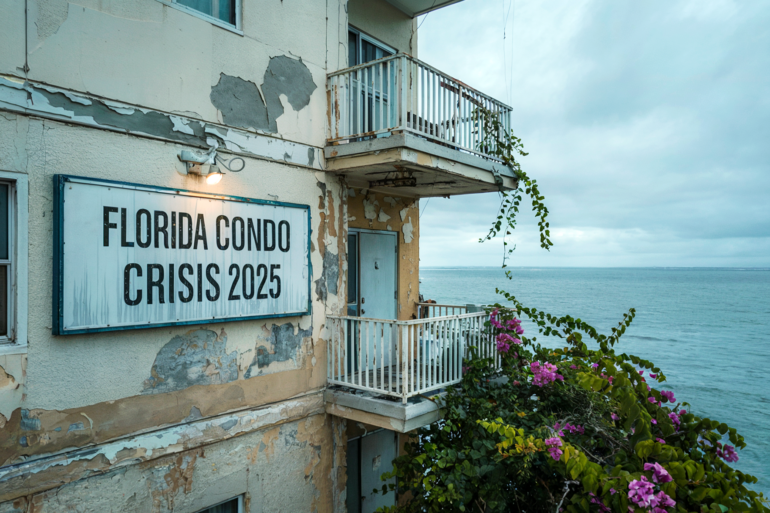Florida Condo Crisis: Experts Warn of Safety and Financial Risks as Boards Stall
Florida Condo Crisis: Experts Warn of Safety and Financial Risks as Boards Stall on Reserve Studies
Florida Condo Crisis: Boards Face Fallout as Reserve Study Deadline Passes
More than two years after Florida enacted sweeping new condo safety laws in response to the 2021 Surfside collapse, many condominium boards have failed to comply — and the consequences are mounting.
The law, Florida Senate Bill 4-D, required that by December 31, 2024, condo buildings three stories or higher and at least 30 years old must undergo structural integrity reserve studies (SIRS) and begin funding reserves accordingly. Now that the deadline has passed, noncompliant buildings are facing higher insurance costs, market devaluation, and increasing scrutiny from insurers, engineers, and state officials.
At the recent Bisnow South Florida Condo Summit, experts warned that many boards are either unaware of the law or actively choosing to delay necessary work, risking financial collapse and resident safety.
“They immediately start wanting to figure out how they can take shortcuts and slash,” said Audrey Ortiz-Blackmon, VP of Coast to Coast General Contractors. “They get very creative.”
The Deadline Has Passed — and So Has the Grace Period
While condo associations had a final opportunity to waive reserves in 2023 with a majority vote, that option is no longer available. Yet, according to a 2023 South Florida Business Journal report, only 44% of Miami-Dade, 41% of Broward, and 28% of Palm Beach condo buildings subject to the law completed their SIRS on time.
Some boards tried to satisfy the law with visual-only inspections or reports from unqualified firms — only to find they must restart the process from scratch. In one case, an engineer was offered a $5,000 bribe to falsely certify a building’sreport.
“I can’t go and certify something made on somebody else’s assessment,” said Misha Mladenovic, president of m2e Consulting Engineers.
Mladenovic added that some boards are simply hoping enforcement will never arrive or that the law will be weakened — what he called a strategy of “kicking the can down the road.”
Financial Pressure Mounts
The impact on the real estate market has been swift and harsh. According to ISG World, the average sale price of condos over 30 years old dropped by 21% between late 2023 and early 2025, due to uncertainty over reserves, upcoming assessments, and insurance instability.
At the same time, the average cost of condo insurance more than doubled — from $72,570 in 2022 to $147,381 in 2024, according to the Sun Sentinel.
“The less that you can show as being active on the front foot to comply with these issues, the harder it is to find a limit taker to insure your risk,” said Matthew Maffai, senior vice president at Marsh.
Insurers are already exiting buildings that haven’t complied. Even for repairable structures, companies are declining to renew policies unless reserves are allocated and repairs are scheduled — a risk now being realized in dozens of older buildings across Florida.
State Officials No Longer Patient
Despite ample media coverage and official outreach campaigns, some condo associations remain unaware or in denial. Attorney Joe Hernandez of Bilzin Sumberg shared that he’s still receiving calls from board members just learning about the new law in 2025.
“It’s stunning to me,” Hernandez said. “But I think that explains why there’s so much noncompliance.”
And the Florida Legislature has taken note. While the statute does not impose direct penalties for missing the deadline, enforcement is happening through other channels. For example, Rep. Vicki Lopez introduced a bill prohibiting Citizens Property Insurance — Florida’s insurer of last resort — from covering noncompliant condos.
That would make some units uninsurable and unsellable — a death knell for buildings that failed to prepare.
Delays Are No Longer an Option
Experts agree that this is no longer a matter of warnings or projections. The financial and safety risks are real, and they are here now.
Insurers and lenders are already flagging some buildings as “high risk,” making it difficult for unit owners to refinance or sell. Others are facing emergency special assessments totaling millions of dollars — often more than earlier planning would have required.
“Nobody is trying to create panic,” Mladenovic said. “But when engineers or inspectors sound the alarm, it’s because lives — and livelihoods — are on the line.”
What Boards Must Do Now
If your condo board has missed the deadline, all is not lost — but action is critical.
- Engage a qualified engineering firm immediately to complete a full SIRS, not just a visual walkthrough.
- Develop a reserve funding plan based on the study and begin collecting.
- Communicate transparently with unit owners. Resistance often comes from a lack of information.
- Prepare for potential lender or insurer audits. Be ready to show documentation of compliance efforts.
- Stay informed on evolving state legislation related to insurance eligibility and funding requirements.
Conclusion
The Surfside tragedy was a wake-up call. Florida’s 2022 legislation was the response. But now, in 2025, the time for awareness and planning is over. The only question that remains for many boards is: what will non-compliance cost you now?
For condo owners and investors, verifying the reserve study status of any property is no longer optional — it’sessential. And for boards, the message is clear: inaction is no longer tolerated.
t’s a current reality.








